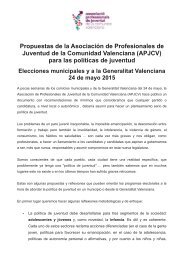c39dc
c39dc
c39dc
Create successful ePaper yourself
Turn your PDF publications into a flip-book with our unique Google optimized e-Paper software.
4.2 Research question 2: What soft-skills and competences are developed<br />
and at what level through non-formal education in youth<br />
organisations?<br />
There is limited literature on the impact of participation in youth<br />
organisations on soft skills development. It is acknowledged in many<br />
of the available studies that ‘hard evidence’ regarding the claims<br />
made in those studies that refer to involvement in youth<br />
organisations and employability between participation in youth<br />
organisations and skills development is lacking (Feldberg 2011 107 ;<br />
see also Henderson et al. 2005 108 ). This study, therefore, placed an<br />
important emphasis on the collection of primary data to answer this<br />
question.<br />
The chapter is organised as follows: first, it presents data on the level<br />
of skills development in youth organisations. Second, it explores a<br />
range of individual and organisational factors (degree of involvement<br />
in youth organisations, involvement with youth organisations outside<br />
the home country, existence of an educational plan and method of<br />
assessment for the skills developed in the youth organisation) that<br />
may affect such degree of development. Third, it examines the<br />
usefulness of the skills developed in youth organisations for young<br />
people’s current occupation.<br />
4.2.1 Soft skills and competences developed by young people in youth<br />
organisations<br />
The soft skills and competences developed by young people in youth<br />
organisations, as reported by young people themselves, are<br />
outlined in Table 4.3 below. This table and subsequent tables on skills<br />
development show the degree to which skills and attitudes have been<br />
gained or improved by young people through involvement in youth<br />
organisations, on a scale from 0= no improvement to 5= high<br />
improvement.<br />
Table 4.3 shows data broken down by level of education of<br />
respondents. We see that, on the whole, young people at the higher<br />
levels of qualification report greater skills development during their<br />
involvement with youth organisations. The improvements reported at<br />
lower levels of formal educational attainment, however, are still<br />
significant – with most improvement levels above 3.0.<br />
The high degree of development of team-working skills, selfconfidence,<br />
intercultural skills, adaptability/ flexibility and<br />
107 Feldberg, H. R. (2011) ‘S’more than just fun and games: teachers’ perceptions on the educational value of camp<br />
programmes for school groups’ MA Thesis, University of Waterloo, Canada.<br />
108 Henderson, K. A., Powell, G. M., & Scanlin, M. M. (2005) ‘Observing outcomes in youth development: An analysis<br />
of mixed methods’ Journal of Parks & Recreation Administration, 23(4), 58-77.<br />
44




